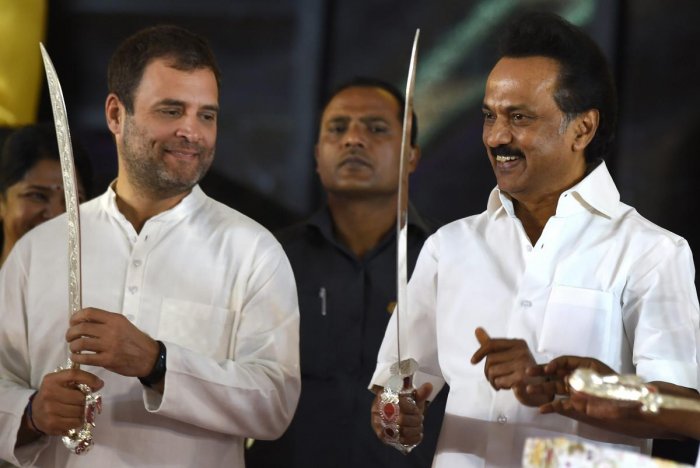
Despite Rahul, going not easy for DMK-Congress alliance in TN

Rahul Gandhi was among friends while in Nagercoil on March 13. With the exception of two political parties, the members of the DMK-led alliance have been working together in the past two years towards the common goals of unseating the BJP and AIADMK governments.
Before hitting Nagercoil in southern Tamil Nadu, Rahul, as part of his campaign tour of the state, addressed over 2,000 students of Stella Maris College, Chennai. He looked sartorially and intellectually prepared for a young and jiving crowd which had pointed questions in its quiver. He relied on what best he could – himself – as he announced to loud cheers that he was at least prepared to stand amid the crowd and take questions impromptu. He wound up the event in style before leaving to a presser in Chennai and then to Nagercoil for a more politically charged meeting of DMK-led allies.
Tempered in fire
The DMK’s alliance has been tempered in the fires of the Jallikattu, anti- NEET and Sterlite protests where all of them have held hands together.
The high point of that chemistry — which probably is the reason why the DMK’s alliance has been decided ahead of the AIADMK’s — came on December 16. DMK president MK Stalin’s endorsement of Rahul Gandhi’s bid to be Prime Minister, delivered that day in Chennai, remains the only such by a major politician outside the Congress party.
However, good chemistry alone will not be a guaranteed success formula for this alliance. The chaotic nature of post-2016 politics in Tamil Nadu means even a double anti-incumbency may not be good enough to ensure an all-40 sweep for the DMK-led alliance across Tamil Nadu and Puducherry.
The first obstacle to the DMK’s success will be the AIADMK: although weakened in its traditional bastion to the South of the state, the party of MG Ramachandran and Jayalalithaa remains a force to be reckoned with in the West. In fact, the appointment of Edappadi K Palaniswami by VK Sasikala as the first Chief Minister from the Kongu Vellalar (Gounder) community and the rise of a new breed of leadership around him means that the AIADMK is stronger in the West than it probably ever was.
In allocating seven seats to the PMK as part of its alliance, the AIADMK has also ensured that the DMK will sweat to dominate the northern regions.
The AIADMK’s contraction in the southern districts of the state does not ensure a walkover for the DMK there. MK Alagiri, elder brother of DMK president Stalin, was the party’s main influencer in the region but is no longer even a member.
The space left by the AIADMK in the southern districts seems to have been occupied by TTV Dhinkaran. The relative of Sasikala, who seems to have a mesmerising hold over the dominant Thevar community and the Dalits of the Southern region, will face his first major electoral test since relegating the AIADMK to the second position and winning from the assembly seat vacated by Jayalalithaa.
The DMK will also know that the Congress is not anywhere close to a well-oiled machine. Internal feuds are rife; it can’t have helped that KS Alagiri was appointed only on February 2 to replace Su. Thirunavukkarasar as the president of its state unit.
Alternative to DMK & AIADMK
Kamal Haasan’s Makkal Needhi Maiam has tried to position itself as an alternative to the AIADMK and the DMK, and will contest in all the seats going to polls. However, he has shown a preference for the latter over the former and this could mean that his party could eat into the DMK’s vote bank.
The best laid plans of these parties for the Lok Sabha elections seemed to go awry the day the Election Commission of India announced that Tamil Nadu will see by-elections to 18 assembly constituencies in conjunction with elections to the Lok Sabha.
The by-elections will mean that the priorities of these parties could change: the AIADMK will now want to ensure that it wins enough seats to ensure its government survives. Similarly, Dhinakaran will have to decide whether his party should focus on national or state politics. After all, 16 of those who had won in these 18 constituencies are now members of his political party, the Amma Makkal Munnetra Kazhagam.
The by-elections may also bring about a shift in the priorities of the DMK, too. Stalin will expect Rahul Gandhi to return the December 16 endorsement: he will go into these by-elections knowing that an exceptional performance will make him the Chief Minister of Tamil Nadu. Stalin will also know that this is his first electoral test as the leader of the DMK; there will be constant comparisons with his recently deceased illustrious father.
Riding a wave of anti-AIADMK and BJP sentiment, the DMK and the Congress will know that these elections are theirs to lose. However, they will also realise that when the results are announced, there may be many who can rightfully claim that they won the day.


